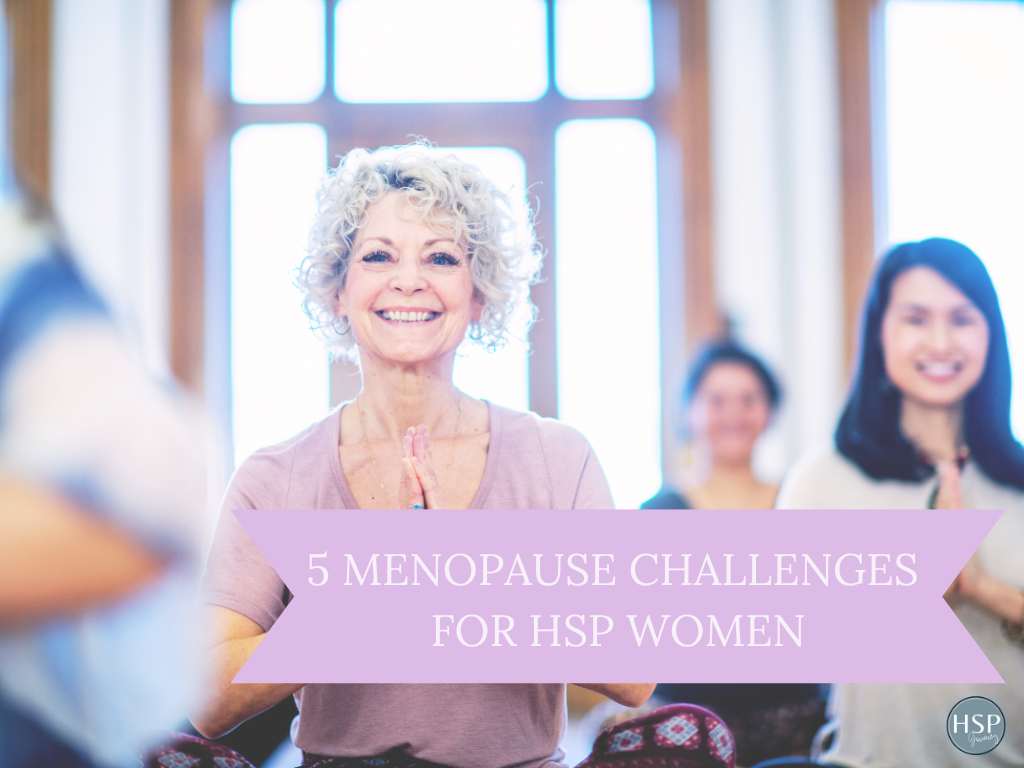Navigating perimenopause, which eventually leads to full menopause, can be a challenging experience, especially for highly sensitive women. It’s a time marked by significant physical and emotional changes, and it’s essential to address both the shortcomings of the medical system and the need for personal healing during this transition. Being aware of these five menopause challenges for HSP women can help you through this completely normal life change.
Understanding your journey is crucial. As you explore the impact of past traumas and losses, you can develop a sense of agency that leads to self-discovery and joy. Engaging in meaningful conversations about these topics can provide support and guidance as you move forward through this transformative phase of your life.

Table of Contents
Why Perimenopause Can Be Challenging for Sensitive Women
HSP Menopause Challenge #1 – The Medical System Fails to Consider the Whole Person
Many healthcare practitioners do not fully understand the complexities of being a Highly Sensitive Person (HSP) or the significant effects that perimenopause can have on both physical and mental health. This disconnect can leave you feeling unheard and unsupported during a time that requires a more holistic approach to care.
HSP Menopause Challenge #2 – Past Trauma May Resurface
During perimenopause, unresolved trauma can come back to the surface, notably affecting your emotional well-being. This resurfacing can lead to feelings of overwhelm and stress, which can be particularly difficult for someone who is highly sensitive. Navigating this emotional turbulence can feel debilitating at times.
HSP Menopause Challenge #3 – Emotional Baggage Can Intensify Challenges
The hormonal fluctuations of perimenopause can amplify feelings of grief and loss, often manifesting as increased anxiety or depression. For an HSP, internalizing emotions, especially anger, can turn into a significant challenge. It is common to have unprocessed feelings accumulated, making this transition even harder. Finding ways to express and process these feelings is vital.
HSP Menopause Challenge #4 – Lack of Control Over Your Body
Having autonomy over your health and body is essential during this transitional period. Sensitive women often struggle to assert their needs, primarily stemming from a tendency towards introversion, especially if past trauma exists. Taking an active role in your healthcare involves voicing your requirements and advocating for yourself clearly.
HSP Menopause Challenge #5 – Self-Compassion is Often Overlooked
Prioritizing self-care and developing self-compassion is critical during perimenopause. Many sensitive women find it challenging to meet their own needs as they navigate emotional and physical changes. Remember, nurturing yourself is not selfish; it’s necessary for maintaining your mental health and overall well-being. Establishing self-care routines can significantly improve your quality of life.
Frequently Asked Questions
What approaches can help with heightened sensitivity and mood fluctuations during menopause?
Managing sensitivity and mood changes during menopause can involve a variety of techniques. You might consider lifestyle adjustments such as regular exercise, a healthy diet, and ensuring adequate sleep. Engaging in mindfulness practices like meditation or yoga can also be beneficial in stabilizing mood swings.
Are there options for menopausal women dealing with increased anxiety?
Yes, there are several treatments available for managing anxiety during menopause. Options may include therapy, yoga, and relaxation techniques. Some women find relief through hormone therapy or natural supplements, but it’s best to consult with a healthcare provider for personalized recommendations.
In what ways can menopause affect a woman’s emotional health?
Menopause can lead to emotional changes due to hormonal fluctuations. You might experience feelings of sadness, irritability, or anxiety. Understanding that these changes are a common part of the menopause journey can help in finding ways to cope effectively.
What methods can help you cope with anger issues related to menopause?
To address anger during menopause, consider using techniques such as deep breathing exercises or journaling to express your feelings. Engaging in regular physical activity can also serve as a healthy outlet for frustration. Connecting with support groups might provide additional comfort and strategies.

Looking for an HSP-Trained coach to help you align your life with your priorities?
Through my Highly Sensitive Person (HSP) certification with the Nickerson Institute, as well as being an HSP, I offer HSP coaching to develop specific goals around your HSP needs. We HSPs frequently deal with anxiety and overstimulated nervous systems that prevent us from achieving peace and attaining our life goals. HSP coaching with me includes a detailed review of your sensitivities and a mutually-desired plan for growth and management of this superpower to shift negativity and begin seeing yourself as the hero of your own story. (Affordable monthly coaching begins at $150/month.)
Can menopause bring about changes in personality or behavior, and how can one manage this?
Menopause can sometimes alter emotional responses, potentially affecting behavior and personality. To navigate these changes, maintaining open communication with friends and family is essential. Seeking professional support from a counselor or therapist can also help you work through these shifts in a constructive manner.
How can you boost motivation and counteract feelings of fatigue during perimenopause?
Finding motivation during perimenopause can be challenging due to fatigue. Setting small, achievable goals can help you regain a sense of accomplishment. Incorporating short bursts of activity into your daily routine and prioritizing self-care practices can also invigorate your energy levels.




